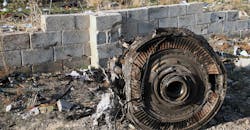UPDATE: Iran Confirms Ukrainian 737 Was Accidentally Shot Down
A Boeing 737-800 carrying Ukrainian International Airlines flight PS752 crashed on the outskirts of Tehran early Wednesday morning in Iran, killing all 176 on board. Iranian officials have issued statements that say they suspect the crash was caused by an engine fire. After initially agreeing, officials from the Ukrainian embassy walked back their comments and emphasized investigations are ongoing.
The 737-800 jetliner is an earlier version of the 737 Max, which has been a major headache for Chicago-based Boeing Co. The older plane is not a 737 Max plane—those remain grounded worldwide—and lacks the software issues blamed for the Boeing 737 Max accidents in Malaysia and Ethiopia. The crashed plane underwent routine maintenance only two days before the crash, and the vice president of Ukraine International said that the plane was in good condition.
Complicating the situation is the tense geopolitical situation between Iran and the United States. The crash occurred shortly after 6:10am local time, mere hours after Iran hit two Iraqi bases housing American troops with dozens of missiles.
A spokesman for Iran’s Civil Aviation Organization said they would follow international protocols and allow the plane maker to help the investigation. The U.S. National Transportation Safety Board, which will require special permission to work in Iran, is monitoring the situation.
Regardless of the cause of the crash, the latest high-profile aviation accident involving Boeing likely couldn’t have come at a worse time. The aerospace company is still working on restoring consumer confidence in its aircraft after 2019 saw Boeing face sustained grilling in front of Congress and upset airlines who lost money on grounded 737s. On Tuesday, Boeing recommended that airlines who purchase the new 737 Max planes put pilots through simulator training, after previously claiming costly simulators wouldn’t be necessary.
In a statement, Boeing said, “This is a tragic event and our heartfelt thoughts are with the crew, passengers, and their families. We are in contact with our airline customer and stand by them in this difficult time. We are ready to assist in any way needed.”
Update: Iran said on January 10th that the Ukranian jetliner that crashed January 8th shortly after takeoff that it was actually shot down, and attributed the cause to "human error." Investigations are ongoing.
About the Author
IW Staff
Find contact information for the IndustryWeek staff: Contact IndustryWeek
